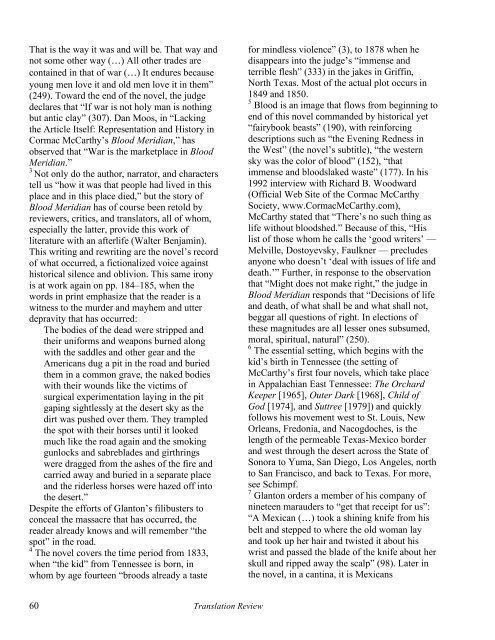Translation Review - The University of Texas at Dallas
Translation Review - The University of Texas at Dallas
Translation Review - The University of Texas at Dallas
Create successful ePaper yourself
Turn your PDF publications into a flip-book with our unique Google optimized e-Paper software.
Th<strong>at</strong> is the way it was and will be. Th<strong>at</strong> way and<br />
not some other way (…) All other trades are<br />
contained in th<strong>at</strong> <strong>of</strong> war (…) It endures because<br />
young men love it and old men love it in them”<br />
(249). Toward the end <strong>of</strong> the novel, the judge<br />
declares th<strong>at</strong> “If war is not holy man is nothing<br />
but antic clay” (307). Dan Moos, in “Lacking<br />
the Article Itself: Represent<strong>at</strong>ion and History in<br />
Cormac McCarthy’s Blood Meridian,” has<br />
observed th<strong>at</strong> “War is the marketplace in Blood<br />
Meridian.”<br />
3<br />
Not only do the author, narr<strong>at</strong>or, and characters<br />
tell us “how it was th<strong>at</strong> people had lived in this<br />
place and in this place died,” but the story <strong>of</strong><br />
Blood Meridian has <strong>of</strong> course been retold by<br />
reviewers, critics, and transl<strong>at</strong>ors, all <strong>of</strong> whom,<br />
especially the l<strong>at</strong>ter, provide this work <strong>of</strong><br />
liter<strong>at</strong>ure with an afterlife (Walter Benjamin).<br />
This writing and rewriting are the novel’s record<br />
<strong>of</strong> wh<strong>at</strong> occurred, a fictionalized voice against<br />
historical silence and oblivion. This same irony<br />
is <strong>at</strong> work again on pp. 184–185, when the<br />
words in print emphasize th<strong>at</strong> the reader is a<br />
witness to the murder and mayhem and utter<br />
depravity th<strong>at</strong> has occurred:<br />
<strong>The</strong> bodies <strong>of</strong> the dead were stripped and<br />
their uniforms and weapons burned along<br />
with the saddles and other gear and the<br />
Americans dug a pit in the road and buried<br />
them in a common grave, the naked bodies<br />
with their wounds like the victims <strong>of</strong><br />
surgical experiment<strong>at</strong>ion laying in the pit<br />
gaping sightlessly <strong>at</strong> the desert sky as the<br />
dirt was pushed over them. <strong>The</strong>y trampled<br />
the spot with their horses until it looked<br />
much like the road again and the smoking<br />
gunlocks and sabreblades and girthrings<br />
were dragged from the ashes <strong>of</strong> the fire and<br />
carried away and buried in a separ<strong>at</strong>e place<br />
and the riderless horses were hazed <strong>of</strong>f into<br />
the desert.”<br />
Despite the efforts <strong>of</strong> Glanton’s filibusters to<br />
conceal the massacre th<strong>at</strong> has occurred, the<br />
reader already knows and will remember “the<br />
spot” in the road.<br />
4 <strong>The</strong> novel covers the time period from 1833,<br />
when “the kid” from Tennessee is born, in<br />
whom by age fourteen “broods already a taste<br />
for mindless violence” (3), to 1878 when he<br />
disappears into the judge’s “immense and<br />
terrible flesh” (333) in the jakes in Griffin,<br />
North <strong>Texas</strong>. Most <strong>of</strong> the actual plot occurs in<br />
1849 and 1850.<br />
5 Blood is an image th<strong>at</strong> flows from beginning to<br />
end <strong>of</strong> this novel commanded by historical yet<br />
“fairybook beasts” (190), with reinforcing<br />
descriptions such as “the Evening Redness in<br />
the West” (the novel’s subtitle), “the western<br />
sky was the color <strong>of</strong> blood” (152), “th<strong>at</strong><br />
immense and bloodslaked waste” (177). In his<br />
1992 interview with Richard B. Woodward<br />
(Official Web Site <strong>of</strong> the Cormac McCarthy<br />
Society, www.CormacMcCarthy.com),<br />
McCarthy st<strong>at</strong>ed th<strong>at</strong> “<strong>The</strong>re’s no such thing as<br />
life without bloodshed.” Because <strong>of</strong> this, “His<br />
list <strong>of</strong> those whom he calls the ‘good writers’ —<br />
Melville, Dostoyevsky, Faulkner — precludes<br />
anyone who doesn’t ‘deal with issues <strong>of</strong> life and<br />
de<strong>at</strong>h.’” Further, in response to the observ<strong>at</strong>ion<br />
th<strong>at</strong> “Might does not make right,” the judge in<br />
Blood Meridian responds th<strong>at</strong> “Decisions <strong>of</strong> life<br />
and de<strong>at</strong>h, <strong>of</strong> wh<strong>at</strong> shall be and wh<strong>at</strong> shall not,<br />
beggar all questions <strong>of</strong> right. In elections <strong>of</strong><br />
these magnitudes are all lesser ones subsumed,<br />
moral, spiritual, n<strong>at</strong>ural” (250).<br />
6 <strong>The</strong> essential setting, which begins with the<br />
kid’s birth in Tennessee (the setting <strong>of</strong><br />
McCarthy’s first four novels, which take place<br />
in Appalachian East Tennessee: <strong>The</strong> Orchard<br />
Keeper [1965], Outer Dark [1968], Child <strong>of</strong><br />
God [1974], and Suttree [1979]) and quickly<br />
follows his movement west to St. Louis, New<br />
Orleans, Fredonia, and Nacogdoches, is the<br />
length <strong>of</strong> the permeable <strong>Texas</strong>-Mexico border<br />
and west through the desert across the St<strong>at</strong>e <strong>of</strong><br />
Sonora to Yuma, San Diego, Los Angeles, north<br />
to San Francisco, and back to <strong>Texas</strong>. For more,<br />
see Schimpf.<br />
7 Glanton orders a member <strong>of</strong> his company <strong>of</strong><br />
nineteen marauders to “get th<strong>at</strong> receipt for us”:<br />
“A Mexican (…) took a shining knife from his<br />
belt and stepped to where the old woman lay<br />
and took up her hair and twisted it about his<br />
wrist and passed the blade <strong>of</strong> the knife about her<br />
skull and ripped away the scalp” (98). L<strong>at</strong>er in<br />
the novel, in a cantina, it is Mexicans<br />
60 <strong>Transl<strong>at</strong>ion</strong> <strong>Review</strong>

















